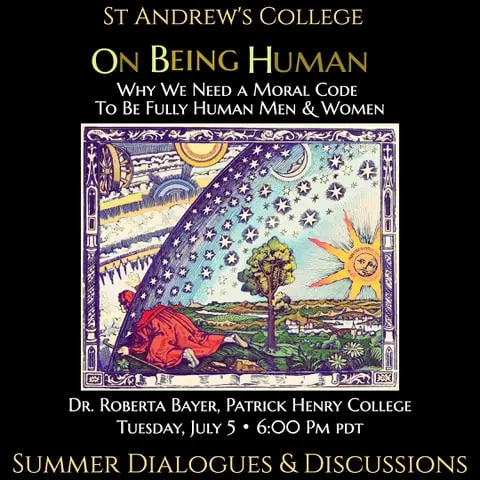Being Human
ST. ANDREWS'S COLLEGE
Summer Dialogues & Discussions

Conversations that Count
Being Human:
C.S. Lewis, The Abolition of Man, Chapter 2
We are told over and over again that morality is a matter of personal choice because there is no objective foundation to morality. Some say that morality and law is rooted in nothing more than preference, and calculation as to how to obtain that preference. Others say that morality and law comes from biological instinct over which we have no control. They deny that morality is objective, impersonal, reasonable, and natural. Yet Saint Paul wrote in Romans 2 that there is a law written on the human heart, and even the pagans can be held responsible for their wickedness.
C.S. Lewis argues, in the second chapter of The Abolition of Man, that human beings require an objective, learned morality by which to conduct their lives and be fully human. What is that moral code, how do we learn it, and why do we need it to be fully human men and women?
St. Andrew’s College visiting professor Dr. Roberta Bayer is an Associate Professor of Political Philosophy at Patrick Henry College in Virginia.
Dr. Bayer teaches courses in the history of Western political thought, ancient and modern.
Dr. Bayer’s current areas of research include the Scottish Enlightenment and the American Founding, scholastic political thought, and modern Christian political thought, with special interest in the history of Anglican theology and the Book of Common Prayer.
Engaging Ideas of Consequence
“The human mind has no more power of inventing a new value than of imagining a new primary colour, or, indeed, of creating a new sun and a new sky for it to move in.”
― C.S. Lewis
“No justification of virtue will enable a man to be virtuous. Without the aid of trained emotions the intellect is powerless against the animal organism. I had sooner play cards against a man who was quite skeptical about ethics, but bred to believe that ‘a gentleman does not cheat’, than against an irreproachable moral philosopher who had been brought up among sharpers.”
― C.S. Lewis
“A dogmatic belief in objective value is necessary to the very idea of a rule which is not tyranny or an obedience which is not slavery.”
― C.S. Lewis
“the difference between the old and the new education being, in a word, the old was a kind of propagation - men transmitting manhood to men; the new is merely propaganda.”
― C.S. Lewis
“If my duty to my parents is a superstition, then so is my duty to posterity. If justice is a superstition, then so is my duty to my country or my race. If the pursuit of scientific knowledge is a real value, then so is conjugal fidelity. The rebellion of new ideologies against the Tao is a rebellion of the branches against the tree: if the rebels could succeed they would find that they had destroyed themselves.”
― C.S. Lewis
“…I am very doubtful whether history shows us one example of a man who, having stepped outside traditional morality and attained power, has used that power benevolently.”
― C.S. Lewis
Contact:
Emmalie Foos
efoos@standrewsalmanor.org
159 Main St. Chester, CA 96020
TheCollegeAtStAndrews.org
(530) 375-0411